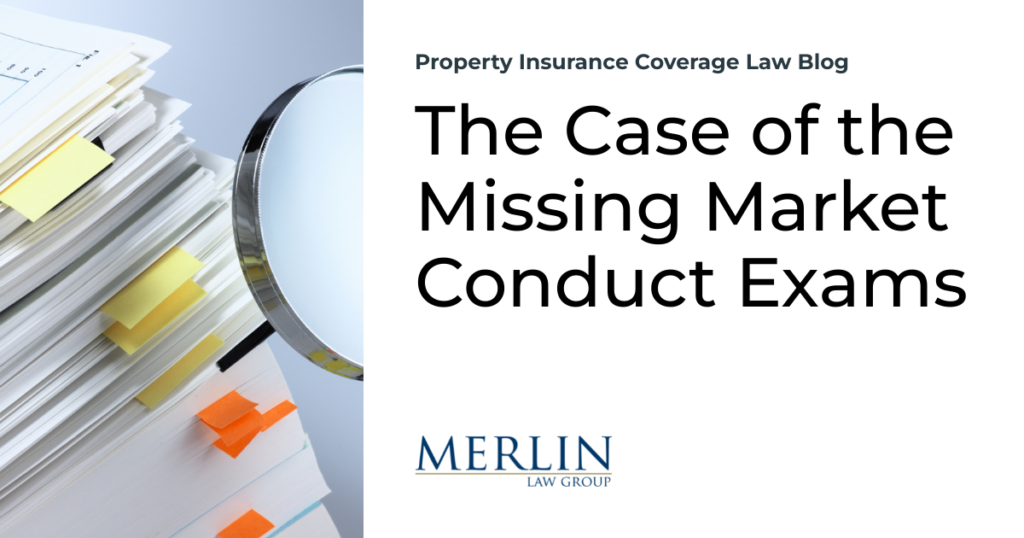The Case of the Missing Market Conduct Exams

As a law firm whose sole focus is representing policyholders in insurance disputes, we spend a lot of time alleging insurance companies are engaging in bad faith practices and fighting tooth and nail for evidence that demonstrates this. We get what information we can through the discovery process, the rules and logistics of which can vary drastically depending on the state, the court, and even the judge. Discovery must be tailored to each individual case, and insurance companies invariably object to requests for information about wider business practices or schemes as too vague, too broad, too burdensome, or irrelevant. This can make obtaining any evidence of bad faith practices we already know are occurring a long and costly battle.
Thankfully, discovery isn’t the only process through which bad faith or unlawful insurance practices can be uncovered. State insurance departments and regulators can also investigate the business practices of insurance companies through market conduct exams to ensure that companies operating in the state are following the law. The importance of market conduct exams has been discussed on this blog before. In April 2022, Mr. Merlin wrote a post about five market conduct exams conducted in Louisiana focusing on the conduct of several insurers in handling claims from hurricanes Laura, Delta, and Zeta. Mr. Merlin noted the exams “found 44 instances of improper activities and/or business practices that were noncompliant with the Louisiana Insurance code.” The Louisiana Insurance Commissioner proposed nearly one million dollars in fines based on the exam findings. Two others posts (here and here) by Mr. Merlin summarize a similar situation in North Dakota, where a market conduct exam into Farmer’s “Bring Back a Billion Program” and claims handling resulted in a $750,000 fine for state law violations. He also explains the Insurance Regulatory Examiners Society’s mission, which is to protect consumers and preserve a robust, competitive marketplace through “fair, firm, [and] honest insurance regulation.”
The laws, regulations, and procedures governing market conduct exams vary by state. In Oklahoma, where I live, the state legislature requires insurers to “annually file with the Insurance Commissioner market conduct annual statements reporting market conduct data of insurers.” 36 OK Stat § 36-311.4(A) (2022). Failure to do so may result in a $1,000 fine. The insurance department has also promulgated rules requiring insurers to submit a Corporate Governance Annual Disclosure, which includes information about the company’s governance framework, procedures for performance evaluation and compensation, and risk assessment processes. Okla. Admin Code § 365:25-7-91. Using these reports and other metrics like financial statements or complaints, the Insurance commissioner has full discretion to determine “whether a market conduct examination or investigation of an insurer should be conducted.” 36 OK Stat § 36-311.4(B)(1)(F)(2022).
The Oklahoma Insurance Department website notes it “perform[s] and publish[es] Market Conduct Examinations.” However, the last published report is from May 2009 (which found Farmers made various claim handling errors and was in violation of Oklahoma law). After I reached out to ask where the rest of the exam reports were, the OID informed me market conduct exams are available upon submitting a FOIA request. This is easier said than done since market conduct exams occur at the discretion of the commissioner, and I could not find any list or notice of what insurers have been examined or when those exams occurred. I have since submitted a FOIA request for a list of all exams performed by the OID since 2009 and am waiting to hear back – I’ll keep you all posted.
I am admittedly a bit skeptical of the reliability of the commissioner determining an exam is warranted based on companies’ self-reporting. From what I have seen of discovery disputes, insurers are loath to tell on themselves. Ideally, other metrics, such as an increase in consumer complaints or a spike in lawsuits – like the one Micah Cartwright pointed out in her recent blog about State Farm – would also inform the commissioner’s decision-making. Given the important role market conduct examinations can play in exposing illegal insurance practices, full transparency throughout the examination and reporting process would better accomplish the whole purpose of market conduct exams and best serve consumers. But for now, at least in Oklahoma, a FOIA request will have to do to learn which market conduct exams have been performed since 2009, followed by another FOIA request to obtain copies of any of those exams.







